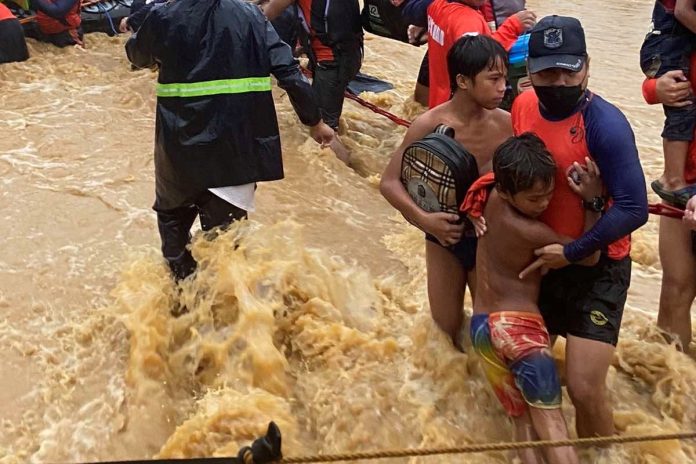It is not the usual Christmastime morning in the Philippines. Typhoon Rai, a super typhoon, devastated the southern part of the country. Thousands of people have fled their homes and sought shelter in evacuation centers.
Churches and schools have opened their doors for evacuees. Churches are not only built for rituals, it is also meant as a space of succor for people in need. More than the liturgical beauty, churches are made massive and strong. Churches are made for those seeking refuge from calamities and to shelter typhoon victims.
The sacred is not only present in the objects and statues, but in the people themselves who are victims of natural and social calamities.
In social media, these churches and religious schools were the first to welcome evacuees ahead of malls and public spaces.
In the morning of December 16, Father Roweno Hamo, OAR, school administrator of a rural high school in Caidiocan, Valencia, Negros Oriental, posted on his Facebook account that the “San Pedro Academy-Recoletos is widely open for families who would like to vacate the houses which are near Okoy River.”
“Our school is open to accommodate you,” these are words resonating on the ground, concerned for the safety of families.
Solidarity is built in the system of the people, inspired by a child willing to live in the midst of human suffering.
The faith of the Filipino people is beyond resiliency. In the midst of the onslaught of Typhoon Rai, our people (even those who have lost everything) are more than willing to share and help. This is the way of the Filipinos’ theology of solidarity, translated in the way of giving, in the form of sharing. It is the grace of kindness, transcending even the borders of religious affinity.
This child molded us to be. We have seen his life of grace, unmeasurable in its form and methods. This Christmastime, we are again given the opportunity not just to reflect on the narrative of his birth; but our very own narrative of “willingness to share” in the midst of nothingness. This too is the mark of our theology of solidarity—helping our people, our Filipinos who died and are suffering from the destructive Typhoon Rai (or Odette).
We are called to share. Solidarity turns the face of destruction into an ambiance of hope. Churches and schools have opened their doors—becoming spaces of hope too, and real “homes” of people.
The people in the Philippines are facing continuous threats of stronger typhoons, induced by the rapid ecological destruction inflicted by corporate powers and irresponsible high-polluting countries.
Again and again, our government continues to allow the massive destruction of our natural resources—evident in mining operations and massive development in cities. These resulted in heavy flooding and massive landslides. Our people are facing the tragic fate of deaths. Uniting in solidarity for the protection of our common home remains a challenge.
Bro. Jaazeal Jakosalem, OAR is a Filipino Laudato Si’ reader. A member of Pusyon Kinaiyahan, an environmental group in the Visayas. Currently based in Germany as a member of PCPR-Europe, he works for Philippine campaigns related to the protection of human rights.









